![[Islamic Republic of Iran Army (IRIA)]](../images/i/ir^army.gif) image by Zoltan Horvath, 1
December 2014
image by Zoltan Horvath, 1
December 2014
Last modified: 2024-08-17 by ian macdonald
Keywords: iran | army |
Links: FOTW homepage |
search |
disclaimer and copyright |
write us |
mirrors
See also:
The Armed Forces of the Islamic Republic of Iran (Persian: نيروهای مسلح
جمهوری اسلامی ايران) include the IRIA (ارتش جمهوری اسلامی ایران), the Army
of the Guardians of the Islamic Revolution (سپاه پاسداران انقلاب
اسلامی) and the Law Enforcement
Force (نيروی انتظامی جمهوری اسلامی ایران).
Source:
http://en.wikipedia.org/wiki/Armed_Forces_of_the_Islamic_Republic_of_Iran
![[Islamic Republic of Iran Army (IRIA)]](../images/i/ir^army.gif) image by Zoltan Horvath, 1
December 2014
image by Zoltan Horvath, 1
December 2014
The Islamic Republic of Iran Army (IRIA) is the ground forces of the
Military of Islamic Republic of Iran. In Iran, it is also called
Artesh,
(ارتش) which is Persian for "army." In modern times, the Army was established
in 1923. It comprises the Islamic Republic of Iran Air Force (IRIAF) (http://en.wikipedia.org/wiki/Islamic_Republic_of_Iran_Air_Force), the
Islamic Republic of Iran Navy (IRIN) (http://en.wikipedia.org/wiki/Islamic_Republic_of_Iran_Navy) and the Islamic Republic of Iran Air Defence Force (http://en.wikipedia.org/wiki/Islamic_Republic_of_Iran_Air_Defense_Force)
Source: http://en.wikipedia.org/wiki/Islamic_Republic_of_Iran_Army
The
flag is a red horizontal flag with the logo (http://en.wikipedia.org/wiki/Islamic_Republic_of_Iran_Army#mediaviewer/File:IRI.Army-Badge.svg) in the middle, with a black border with an Arabic inscription and four
stylized Perso-Arabic script of the Arabic word Allah ("God") in gold, as
seen here:
http://4.bp.blogspot.com/_qu97vVnoSKc/S54mM2_kXAI/AAAAAAAAE34/DDH1nkwKE7Q/s1600-h/Gen+Ataollah+Salehi+commander+of+Iranian+artesh.jpg
(flag on the right) (source:
http://www.uskowioniran.com/2010/03/iran-military-commander-warns.html).
Esteban Rivera, 30 November 2014
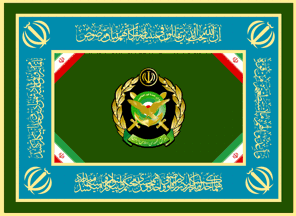 image located by William Garrison, 30
August 2019
image located by William Garrison, 30
August 2019
The ارتش جمهوری اسلامی ایران , abbreviated as آجا (English: Army of the
Islamic Republic of Iran, abbreviated as AJA) is directed by the (Army) Joint
Headquarters (English: Joint Staff), which coordinates its four branches: the
Ground Forces (NEZAJA), Air Force (NAHAJA), Navy (NEDAJA) and the Air Defense
Force (PADAJA).
Esteban Rivera, 31 August 2019
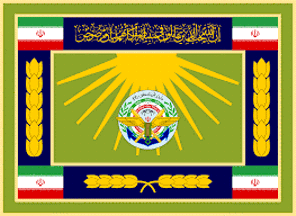 image located by William Garrison, 30
August 2019
image located by William Garrison, 30
August 2019
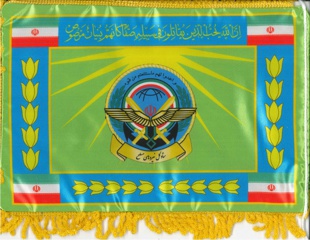 image
located by William Garrison,
4
September 2019
image
located by William Garrison,
4
September 2019
"Setsad-e Koll-e Niroohay-e Mosallah" = "General Staff of the Armed Forces"
(ceremonial flag)
William Garrison, 4
September 2019
 image
located by William Garrison,
3 July 2024
image
located by William Garrison,
3 July 2024
In this derafsh (ceremonial flag), beneath the main logo/seal, is the Farsi yellow-script slogan: "Setsad-e Koll-e Niroohay-e Mosallah" or, in English: "General Staff of the Armed Forces" (GSAF). At the right hoist side there are 5 cloth tabs for the insertion of a flag-pole. The GSAF is the most senior military body in Iran, to implement policy, monitor and coordinate the activities of three armed commands: (1) the "Armed Forces" [Artesh: which consists of the Army, Navy & Air Forces] (for domestic defense), (2) the "Iranian Revolutionary Guards Corps" [IRGC/Sepah/Pasdaran] (for offensive ops), and (3) Iran's civilian-police force: the "Law Enforcement Command" [NAJA]. Iran's "Supreme Leader" (Ali H. Khamenei, c. 2024) controls the GSAF. Iran's "Ministry of Defence and Armed Forces Logistics" is responsible for planning and funding of the armed forces, but it reports to Iran's "president" - who is submissive to the "Supreme Leader".
William Garrison, 3 July 2024
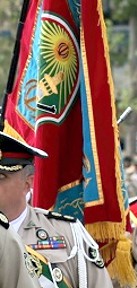 image located by William Garrison, 5 September 2023
image located by William Garrison, 5 September 2023
Red-field Artesh (army) derafsh (ceremonial) flag. Different from similar
sun-imaged flags as the black-colored national "Allah" emblem/logo of Iran is
displayed inside the sun.
William Garrison, 5 September 2023
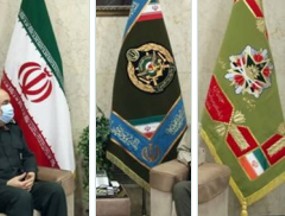 image located by William Garrison, 2 May 2022
image located by William Garrison, 2 May 2022
Source:
https://www.farsnews.ir/en/news/14010131000340/IRGC-Cmmander-Underlines-Prdcin-f-Mre-Advanced-Elecrnic-Warfare
TEHRAN (FNA)- Commander of the Islamic Revolution Guards Corps (IRGC) Major
General Hossein Salami in a meeting with Iranian Army Commander Major General
Seyed Abdolrahim Moussavi stressed the need for the development of more advanced
electronic warfare to defend the country.
http://www.farsnews.ir
Three flags: (left-to-right): Iranian
national flag; Iranian Artesh/Army flag; (far right) unknown light-olive-green
Iranian Army flag (maybe a new variety of some Chief of Army Command flag).
Commander of the "Islamic Revolution Guards Corps" (IRGC) Major General Hossein
Salami (left) in a meeting with Iranian Army Commander Major General Seyed
Abdolrahim Moussavi (right).
William Garrison, 2 May 2022
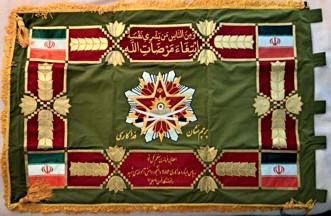 image located by William Garrison, 29 May 2023
image located by William Garrison, 29 May 2023
A clearer photo of the Chief of Army Command flag.
![[Velayat/Army derafsh]](../images/i/ir^velay.gif) image located by Bill
Garrison, 30 September 2019
image located by Bill
Garrison, 30 September 2019
IRI [Islamic Republic of Iran] the Islamic Republic of Iran Army [Artesh-e
Jomhouri-ye Eslami-ye Iran, or "Artesh" in short] = "Army or joint military
logo".
"Army" logo: incorporates all 3 military branches: Army (swords),
Air Force (falcon) & Navy (anchor) designs. The "ground forces" refers to what
most countries call their "army" (but in Iran the "army" is comprised of all 3
branches). "derafsh" (Farsi/Persian) = colorful ceremonial flag.
This
"sun ray"-design flag ("derafsh" or colorful ceremonial flag) is referred to as
the "Derafsh of Velayat" or "flag of the Chief Jurist", who is called the "Vali-e
Faqhih" (Guardian Jurist). He guides the Iranian government as its "Velayat-e
faqih" (the office of the "Guardianship of the Islamic Jurist" or "Governance of
the Jurist") [that being Ali Hosseini Khamenei c. 2019]. Shia Islam postulates
that Islam gives a https://en.wikipedia.org/wiki/Faq%C4%ABh (Islamic jurist)
custodianship over people. The constitution of Iran calls for a faqih, or Vali-ye
faqih (Guardian Jurist) to serve as the "Supreme Leader" (rahbar-e mo'azzam) of
the government. He also serves as the commander-in-chief of the armed forces and
controls foreign policy. He is superior to the president [being Hasan Rouhani c.
2019] of Iran (Rayis Jomhur-e Irān) who implements the national economic
policies of the country, and who represents the country at diplomatic events.
This flag is displayed at state functions when the Iranian president receives
foreign dignitaries or when he participates in public events -- such as in
parades. Although this flag is known as the "Joint Chiefs of the Army" flag, it
is nicknamed the "Derafsh of Velayat" -- as Iran's first velayat and military
commander-in-chief [Ayatollah R. Khomeini c. 1980s] presented it to the Iranian
Army ("artesh") --which includes the combined army, air force and navy. So while
this derafsh is perceived as a military flag, it also represents the office of
the government's civilian leader (velayat) who commands the military. Therefore,
it is regarded as the "most important" of all the derafsh or colorful ceremonial
flags. The word "Allah" appears at the top of the yellow sun's rays. [In the
photo one sees the former Iranian Pres. M. Ahmadinejad bowing to the Velayat
flag in respect to the office (velayat) of his boss: the Iranian "Supreme
Leader" (rahbar-e mo'azzam), c. Oct. 2007 -- then being Ayatollah Ali Hosseni
Khamenei].
William Garrison, 30 September 2019
I've seen a photo of the same flag with escort captioned as 'The Honor
Guard'; but I don't know whether the Honor Guard are a presidential guard unit,
or something else entirely. It's not a straightforward Iranian regimental
colour, which does not have the tassels at the corners, and has the national
flag placed diagonally in each corner. The central device of a regimental colour
appears to be a slightly less elaborate version of the one on display here.
Other photos of the Honour Guard are posted
here and
here.
Ian Sumner, 24 October 2007
Presidential Honour Guards Flag is simply one of the multiple duties of this
flag. It is also the general - MP (Military Police)/Central Provost of Islamic
Republic of Iran Army (Persian: دژبان مرکز ارتش جمهوری اسلامی ایران; Dežbān
Markaz), acronymed DEJAJA (Persian: دژاجا), and represents the provost and
military police with an authority within all military branches of the
Islamic Republic of Iran Army. The provost is a
subdivision to the military's (English: Joint Staff, sometimes referred to as
General Staff) and has seniority over designated provosts —like the "Sea Police"
(Persian: پلیس دریائی) of (the) Navy and the "Air Police" (Persian: پلیس
هوائی) in the Air Force.
The provost is also responsible for performing
ceremonial duties; it has honor guard units, including the "Presidential
Ceremony Guard" (Persian: گارد تشریفات ریاست جمهوری). It was established on
October 1, 1330 (Persian calendar, equivalent to 1951.
Sources:
https://fa.wikipedia.org/wiki and
https://en.wikipedia.org/wiki/Central_Provost_of_Islamic_Republic_of_Iran_Army
The flag can be seen second from left to right):
https://bayanbox.ir/view/8914791540297656794/44337-636.jpg, source:
https://majalenezami.blog.ir/tag/
Esteban Rivera, 5 October 2019
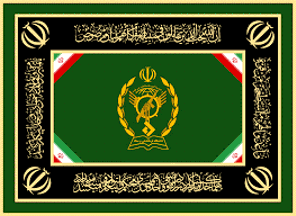 image located by William Garrison, 30
August 2019
image located by William Garrison, 30
August 2019
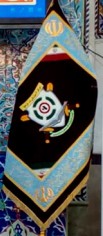 image located by William Garrison, 23 April 2022
image located by William Garrison, 23 April 2022
Source
https://iranpress.com/content/34177/enemy-afraid-iran-defense-capabilities-admiral-sayyari
Caption: an image of an Iranian military flag. The article is about as
clear-as-mud in trying to identify which military unit this flag represents. As
the article refers to Iranian Rear Admiral H. Sayyari, is this a "navy" flag,
or, if we remember that the Iranian navy is actually part of the overall Iranian
"Artesh" (military) -- this flag is in the bigger joint army-navy "Artesh"; so,
this could be the flag of the joint "Army for Coordination" command element
(which is mentioned in the article). c. Feb. 2021. The "Army for Coordination"
is most likely not a real "army" of many soldiers, instead it is probably some
small, command-coordination staff -- somehow is worthy of its own flag.
[Pictured: Rear Admiral Habibollah Sayyari, the Deputy Chief of the Army for
Coordination; Feb. 2021.]
William Garrison, 23 April 2022
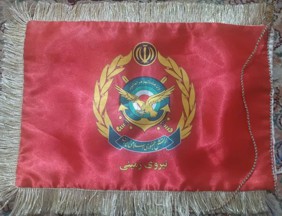 image located by William Garrison, 31 January 2024
image located by William Garrison, 31 January 2024
A desktop flag of the Iran Artesh military's "Joint Staff", the bottom golden Farsi slogan reads: "Joint Staff"; c. 2023. Iran has two separate yet similar military systems: (a) the Artesh and (b) the IRGC. The Artesh has about five times the number of military personnel than has the IRGC. Both have their own "ground forces" i.e. "army", as well as their own air forces and navies. The Artesh is the primary military system to "defend" Iran from attack, or go on the overt offense, as during the 1980s war with Iraq. The IRGC is tasked with (a) suppressing domestic political opposition to the "vilayet" theological political system, and (b) providing and promoting "covert-offense" pro-Shia/Shiite "militias" throughout the Levant (Middle East) region to expand Iran's interests therein - such as through the "Quds Force" or the "Popular Mobilization Forces". These militias are used to "influence" other neighboring governments to follow Iran's political agenda and provide attacks against Israel, without directly implicating Iran. The Iranian "General Staff" coordinates intermixing "Joint Service" military activities between the Artesh and the IRGC. Whereas the Artesh "Joint Staff" coordinates the military activities within its own army, navy, aerospace, & air forces. The IRGC has its own "Joint Staff" (although I do not see a flag for it). Sometimes there can be confusion between the wording of "general staff" versus "joint staff", as their organization can change.
William Garrison, 31 January 2024
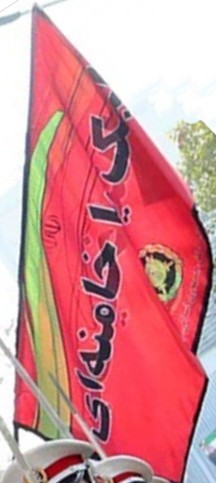 image located by William Garrison,
12 January 2021
image located by William Garrison,
12 January 2021
Source:
https://fa.wikipedia.org/wiki/
Caption: Flag carried in parade during
the funeral of Mohsen Fakhrizadeh at the Iranian Ministry of Defense
headquarters in Theran, Iran on 30 Nov 2020. The black slogan reads: "Labbaik-a
Ya Khamenei" or "For Honor of our Leader Khamenei" who is the current "Supreme
Leader" of Iran. Beneath the slogan is the logo of the defensive "Artesh"
military system (which is composed jointly of the army, navy & air force; but is
separate from the offensive-oriented "Pasdaran" military system). This flag is
like a military Honor Guard flag for Khamenei. Fakhrizadeh was allegedly the
director of the organization running Iran's nuclear-weapons program. He was
assassinated on 27 Nov 2020 in a road ambush in Absard outside of Tehran, Iran.
William Garrison, 12 January 2021